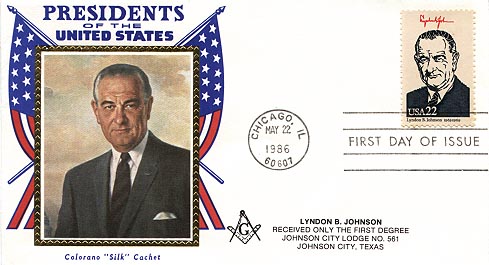Lyndon B.
Johnson
36th
President of the United States

"Were there no outside
world," wrote journalist Theodore H. White in 1969, "... Lyndon
Johnson might conceivably have gone down as the greatest of the twentieth
century Presidents." But the world of foreign affairs, in the form
of the Vietnam War, did intrude upon Johnson who for so much of his political
career was concerned chiefly with domestic programs, and his response to the
war eventually destroyed his hold on the electorate.
Johnson was born in 1908 near
Stonewall, Texas. He graduated from Southwest Texas State Teachers
College in 1930, taught high school for a year and then plunged into politics,
accompanying Texas Congressman Richard M. Kleberg to Washington as his
legislative secretary in 1931. The young Johnson learned quickly, and
soon caught the eye of influential Texas Congressman Sam Rayburn and of the
President, Franklin D. Roosevelt, who warmly appreciated his zealous support
of the New Deal and made him a protege, appointing him Texas administrator of
the National Youth Administration in 1935. Meanwhile, in 1934, Johnson
had met and married Claudia Alta (Lady Bird) Taylor, whose vivacity,
shrewdness and ambition proved enormous assets to her husband's career.
Although Johnson stayed clear of
the 1960 presidential primaries, he made a strenuous last-ditched convention
effort to obtain the Democratic nomination. He was swamped by the forces
of John F. Kennedy, who then astonished the nation by asking Johnson, whose
practical abilities Kennedy respected and whose southern support he sorely
needed, to be his running mate. Johnson accepted. Old-fashioned stumping
by Johnson brought in enough Southern and Western support to help garner
Kennedy's razor-thin victory margin. The Vice Presidency did not suit
Johnson's activist temperament, but he remained a loyal subordinate to the
President.
On November 22, 1963, two hours
after Kennedy's assassination in Dallas, Johnson was sworn in as the 36th
President aboard Air Force One, the presidential jet, at Love Field outside
the city. He lost little time in taking charge. Much of Kennedy's
domestic program had been bottled up in Congress; Johnson got it passed.
Employing emotional appeals to patriotism, sympathy for the late President and
his own brand of persuasion, Johnson won adoption of the sweeping Civil Rights
Act of 1964, the Tax Reduction Act, Federal aid to education and mass
transportation, and extensive anti-poverty legislation--all within nine months
of taking office. Running for the Presidency in his own right in 1964,
Johnson defeated Senator Barry M. Goldwater by one of the widest popular
margins in American history. Johnson then launched his Great Society
program, an all-embracing package of domestic legislation, and in doing so
compiled a legislative record unmatched since the early days of the New Deal.
By early spring of 1968--when he
outpolled primary challenger Eugene McCarthy by the thinnest of margins in New
Hampshire--it was apparent his Administration was in grave trouble. But
even his most intimate aides were stunned when, on March 31, Johnson announced
during a television address to the nation that he would neither seek nor
accept renomination. At the same time he ordered a sharp reduction in
the bombing of North Vietnam and called for peace negotiations, which were
initiated in Paris during his term in office.
In his last political act,
Johnson used his remaining influence to secure the political nomination for
Vice President Hubert Humphrey at the strife-torn Chicago convention in
August, 1968. Johnson then retired to his ranch in Johnson City to work
on his memoirs and assemble documents for the Johnson Library at the
University of Texas. His book, The Vantage Point, was published in
1971. He died of a heart attack early in 1973.
It should be noted that Lyndon
Johnson only received the first or "Entered Apprentice" Degree in
Freemasonry at Johnson City Lodge No. 561 in Johnson City, Texas.

